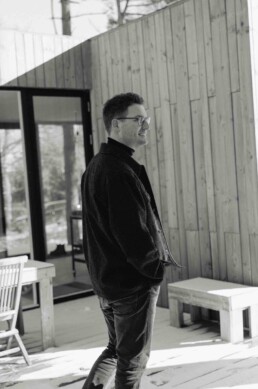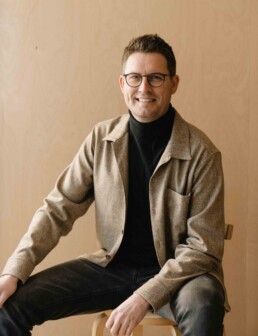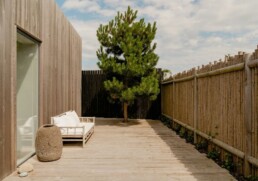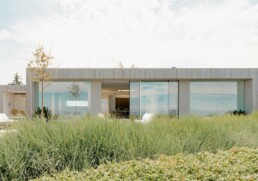Landfolk co-founder: Curiosity is the most important superpower
🇩🇰 Du finder den danske version af denne artikel her.
Conversation with Christian Schwarz Lausten, Co-founder & CEO of Landfolk
Christian Schwarz Lausten and Anders Boelskifte Mogensen have been business partners for over a decade. They founded Gaest.com, which was later acquired by Airbnb, and have since continued to invest and launch new ventures together. Most recently, they launched Landfolk, a platform that reimagines summer house rentals with a focus on quality and unique experiences. Their journey has been driven by creativity, curiosity, and an ability to spot opportunities where others see limitations. Time and again, they have proven that they don’t just follow trends – they create them.
We sat down with Christian to hear his story and vision for the future of Landfolk.

Christian Schwarz Lausten, Co-founder & CEO, Landfolk.
Landfolk, founded in 2021 by former Airbnb professionals, is a technology-driven marketplace for handpicked summer houses, catering to the growing demand for authentic holiday experiences. With ambitions to become a leading lifestyle brand in the vacation rental market, Landfolk is driven by the trend toward mental wellness. These ambitions were significantly reinforced by a major investment from EIFO, SEED Capital, and Heartland in 2024.
Did it always seem written in the stars that you would create your own career path?
“My godfather was a journalist, and I remember accompanying him on assignments. That really inspired me—the idea of diving into a subject and then communicating it to others. So, as a child, that was probably what I dreamed of becoming.
Later, I developed an interest in the internet, which, for me, actually predates the ‘world wide web.’ I go all the way back to the BBS (Bulletin Board System) era. There, you could exchange files, and I vividly remember my first mind-blowing experience: when Ritt Bjerregaard’s book Kommissærens dagbog, which had been legally banned, was leaked on a BBS. It’s hard to imagine now just how wild and fascinating that was back then.
I completely bought into the idealistic idea that everyone should have access to information while also being able to contribute in return.
That concept was revolutionary at the time, and I was deeply fascinated by it. Then came the rise of the ‘world wide web’ with AltaVista, Yahoo, and here in Denmark, Jubii—so a lot was happening. I started building websites, spending a lot of time on it, and it was amazing that you could actually make some money from it too.
So, to answer your question: it was more my interests and passions that pulled me in this direction. But I was probably also naturally inclined to work best without a boss. The idea of freedom never scared me.
In 1998, I started studying Information Science, and that’s where I met Anders.”
(Editor’s note: Boelskifte Mogensen, with whom Christian has co-founded and invested in multiple companies over the years—and continues to do so today.)
Many Danish companies suffer from a small-market syndrome
Yes, and from there, things moved quickly. You founded the consultancy firm Seismonaut (which Anders and Christian successfully exited in 2019) and initiated major events like Aarhus Internet Week, which I personally attended several times. How do you look back on that time?
“It was an exciting time. It’s impossible to give a short answer. My thesis was about online communities. I wrote about Wikipedia and am still inspired by its built-in democratic technology. In many ways, those ideas have been the foundation for many of the visions and projects we’ve pursued since.
In the context of where we are today, we founded Gaest.com in 2015. We wanted to build a business that could generate revenue even while we slept. You can’t do that with a consultancy like Seismonaut. Running a consultancy is really tough, and I have great respect for those who do it.”
Gaest.com was a platform founded by Anders and Christian in 2015, functioning as an “Airbnb for meeting rooms,” where businesses and individuals could rent unique and inspiring spaces by the hour.
But after just 3.5 years, they were acquired by the giants at Airbnb. Gaest.com’s technology and expertise were integrated into Airbnb for Work, and all employees – including Anders and Christian – became part of Airbnb, which even established an office in Denmark solely because of them.
What did you do so well?
“We actually started out by saying that it would be fun if we got acquired by Airbnb. They were a huge source of inspiration for us. On top of that, we placed a strong emphasis on design. It was crucial for us that everything looked great and that the user experience was top-notch. Our brand had to be razor-sharp.
That’s why we prioritized investing in branding from the very beginning, and we thought internationally from day one. I think that’s incredibly important.
One of the biggest challenges for Danish companies is what I’d call a ‘small-country syndrome’—or maybe even Janteloven. It’s not just about communicating in English; that’s just a hygiene factor. It’s about having an international mindset, particularly in building relationships. Early on, we brought in an advisor—a Dane who had lived in Silicon Valley for many years—to join our advisory board. If you don’t position yourself for luck and opportunity, it won’t happen. And one way to do that is by staying curious beyond your own borders.”
If you don't position yourself for luck and opportunity, it won't happen.

Southern Europe is important to us
After Airbnb and Gaest.com, you decided to start fresh and create Landfolk. What’s the mission behind Landfolk?
“We started with seven co-founders – all former Airbnb employees. That allowed us to get quickly up and running with the important things. The mission was to build a new marketplace in a space where we could create a large business, even just in Denmark alone.
We felt that other marketplaces, including Airbnb, had become too complicated to use – it took too long to find the cool places. The idea came from a love for staying in holiday homes, but also from a personal frustration with how dull and uninspiring the experience often was when trying to find and book a unique summer house.
Our platform needed to be more curated – within ‘affordable luxury.’ We wanted to build a stylish brand and a tech platform that we own and have control over. That was the simple analysis.”
Where is the company now after four years?
“Without a doubt, we’ve proven our worth. We have a ‘product-market fit,’ which we can see in all our key metrics and the value the marketplace generates. We really score well on satisfaction surveys from both hosts and guests, on Trustpilot as well as our internal system. That’s crucial for a company like ours, and I’m really proud on behalf of the entire team.”
We want to grow significantly
What are the ambitions for Landfolk?
“Now we need to test whether this can work outside Denmark’s borders as well. We know it works in Sweden, Norway, and Germany. Now, we’ve started with France and Italy. Southern Europe is an important part of Europeans’ holiday mix, so it’s a key market for us.”
Can you give a prediction of where you’ll be in 2-3 years?
“I think in 2-3 years, we’ll have more than just a few countries on the platform. Additionally, we hopefully will have grown 2-3-400% in bookings and most other key metrics. We’re 60+ employees now, and what’s fascinating about it is that as we scale and grow, we don’t necessarily need to hire at the same rate as we did in the early years. Our tech platform handles a lot. So, we don’t need to have the same number of people to open new countries as we were used to. That’s pretty interesting.”

Curiosity is important
Where do you keep finding your drive from? Why do you keep going?
“Fundamentally, I just think it’s great to create something. It’s not because I want to compare myself to a writer or an artist, but to have an idea, start with a blank slate, and get more and more people to believe in that idea – it’s a classic creative drive where all growth starts with a small seed. I find that fascinating.
What I’ve gotten better at is enjoying the day-to-day operations. I think that’s an important lesson as you get older. Both Anders and I struggled with that earlier. There were always great ideas that we almost simultaneously shouted ‘YES!’ to. We haven’t even talked about our hotel venture in Nigeria – we’ll save that for another day.
But when I get up in the morning, it’s always with the mindset that we need to do it just a little bit better than yesterday and take care of our culture. That it always lives on and moves in a direction that’s good for our people and the business. I think that’s fun.”
What inspires you personally?
“I think the most important superpower in life is curiosity. It makes us better employees, leaders, and people in general. I believe it’s fundamental to us.
That’s why I read a lot of media, listen to podcasts, talk to tons of people, and have many meetings with folks who ask if they can come by. So I spend a lot of my day soaking up information or talking with people. I love hearing about other people’s businesses.
Right now, I’m reading Piet Hein’s autobiography. I really recommend it. Two volumes, 700 pages. He lived the wildest life. He’s a great example that curiosity is absolutely essential to creating. He knew people like Niels Bohr and Albert Einstein. He regularly had coffee with Karen Blixen. What an incredible life that must have been in 1930s and 40s Copenhagen.”
And that’s a whole different story. We look forward to following Landfolk on dontt.dk.

Get smarter, faster!
Get dontt.dk’s newsletter for free: You can receive our weekly update for free on culture, branding, entrepreneurship & inspiration, with a focus on Copenhagen.


